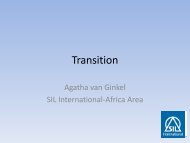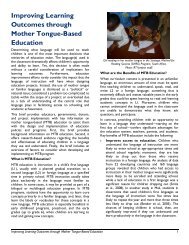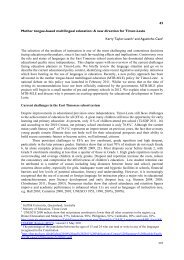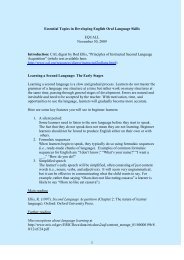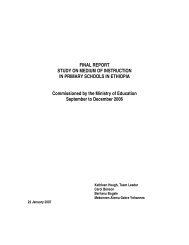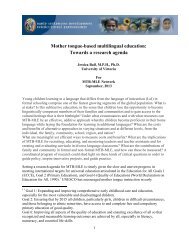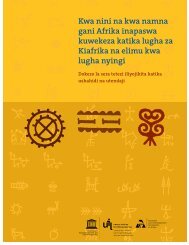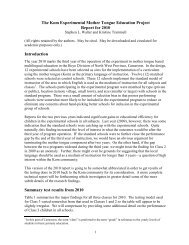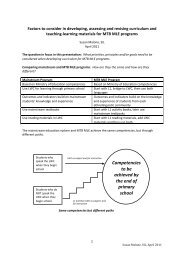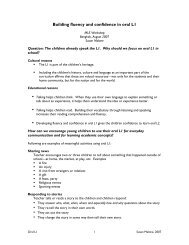Part I.pdf - MTB-MLE Network
Part I.pdf - MTB-MLE Network
Part I.pdf - MTB-MLE Network
You also want an ePaper? Increase the reach of your titles
YUMPU automatically turns print PDFs into web optimized ePapers that Google loves.
Stage 4 – Ongoing education. At this stage, minority language learners should be able tocontinue learning in both their first and second languages, either in the formal or non-formaleducation systems or through informal learning.Challenges to developing <strong>MLE</strong> programmes in multilingual contextsMost people agree that it makes little sense to force children or adults to learn in a language theyneither speak nor understand. Why, then, has there not been more support for <strong>MLE</strong>? The followingreasons are frequently given why <strong>MLE</strong> “can’t be done”:“Supporting diversity will foster divisiveness and lead to ethnic conflict.” Some LWC speakersclaim that linguistic and cultural diversity leads to ethnic strife, arguing that a single languageand culture are necessary for national unity. A glance at recent and current history shows theopposite is more often true: it is when their language and ethnicity are suppressed that peopleare more likely to rebel. Consider the Bangladeshis who fought a war and gained independencefrom Pakistan over the issue of language, the Lithuanians, whose anger over the mandatoryuse of Russian in their schools was an early factor leading to their break with the Soviet Unionor the Catalonians who are even now agitating against what they perceive as the Spanishgovernment’s linguistic and cultural imperialism. Compare those situations with Papua NewGuinea where the government has initiated early education in over 300 of the country’s820 languages. PNG celebrates rather than regrets its diversity, as noted by John Waiko, formerMinister of Education:Our greatest national resource is the diversity of cultures in our country. Diversity means more viewpointsto clarify, more ways of solving problems, more creative ideas, a greater ability to deal with change…Where diversity is crushed…the nation becomes weak and divided (Waiko, 1997).“Learning in one’s first language will mean less success in learning a second language.”The argument here is that ML learners need as much time-on-task as possible in the LWC,even if they do not speak and understand it in the beginning – that giving time to learningthe ML will result in poor learning of the LWC. Williams and Cooke argue that the oppositeis true:It is abundantly clear that education in a language that few learners, and not all teachers, have mastereddetracts from quality and compounds the other problems of economically impoverished contexts (Williams& Cooke, 2002: 317, quoted in Benson, 2003, unpublished paper).In fact, the argument that it’s better to “submerge” 12 learners directly in the LWC, even thoughthey neither speak nor understand it, makes so little pedagogical sense that one must assumethat educators making such an argument have other reasons for resisting <strong>MLE</strong>.The fact that this is also the reason why some ethnic minority parents resist <strong>MLE</strong> programmesfor their children emphasizes the need for more and better awareness-raising in theircommunities. Unfortunately, awareness-raising and/or mobilization among the intendedbeneficiaries of <strong>MLE</strong> programmes is too often forgotten in the hurry to establish programmes.12That is, forcing a learner to learn in a strange language is equivalent to throwing a child into deep water in order to teach thechild to swim.77



